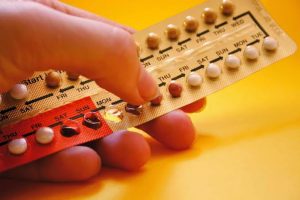
This year, you have decided to do everything in your power to stay healthy; you take more veggies and fruits, do more exercises, ditch sugar and other highly processed foods and even had to swap somethings for healthier alternative and that’s great. But, every other day, you still pop some birth control pills which may be depleting the amount of essential vitamins and nutrients in your body. This alone can potentially undo every effort you have been putting in to stay healthy. Sadly, for so many women, this is a reality as they must be on birth control pills.
The truth remains that even with various methods of contraception, oral contraceptives seems to be the most accessible, affordable and commonly used form of birth control.
Almost 17% of Nigerian women are on birth pills. Definitely every woman that uses these pills are aware of what they are capable of, but not all know that these birth control pills can alter how nutrients are used by the body, thereby leading to possible deficiencies.
Birth control don’t only increase the risk of vitamin deficiency, they also may be draining your body of essential nutrients needed for mood, cognition, and cardiovascular health.
HOW DOES BIRTH CONTROL PILLS AFFECT NUTRENT AVAILABILITY
There are 2 major ways in which OCPs result in nutrients depletion.
Firstly ,the work of OCPs is to introduce artifical hormones into your body, when this happens, there would be more hormones for your liver to deal with, meaning there would be need for more nutrients for your liver to carry out its functions
Secondly, OCPs has the tendency to distort your intestinal walls. When this occurs, less nutrients are absorbed and available for utilization
This is not to scare you, it’s just for awareness. You can still be on birth control pills, but be sure to supplement on prenatal vitamins (especially those ones that tends to be depleted ) as you’re on the “pills”
For a few important vitamins, lets discuss how birth control pills affect them:
– BIRTH CONTROL AND VITAMIN D DEFICIENCY
Vitamin D is important for maintaining the immune system and calcium levels and also serve as a hormone. As adequate calcium is essential for bone health, vitamin D is also essential for bone health.
According to a new study published in the Endocrine Society’s Journal of Clinical Endocrinology & Metabolism, birth pills with estrogen are seen to lower vitamin D levels. This can be adjusted by increasing exposure to sunlight which can improve vitamin D levels by 20% in women on oral contraceptives.
Vitamin D deficiency is associated with pregnancy complications such as preeclampsia, a condition characterized by high blood pressure and kidney and liver disorders. It also increases the risk of childhood disorders, such as type 1 diabetes and asthma.
It is important to supplement on vitamin D and also incorporate vitamin D rich food sources into the diet if you would continue with birth control pills. Examples of vitamin D rich foods include: Fatty fish, like tuna, mackerel, and salmon, Foods fortified with vitamin D, like some dairy products, orange juice, soy milk, and cereals, Beef liver, Cheese, Egg yolks
BIRTH CONTROL AND VITAMIN B DEFICIENCY
Vitamins such as B6, B9, and B12, play an important role in maintaining normal functions of cells and nerves. Their importance in the body cannot be overemphasised as deficiency of any of these B vitamins can lead to depression, anemia, and poor cognitive functions.
Furthermore, B vitamins are also paramount for normal health and development of the fetus as well as neurological development too.
BIRTH CONTROL AND FOLATE DEFICIENCY
For example, research has proven a link between oral contraceptive pills and low blood folate levels.
Also, research also has it that oral contraceptive may increase the risk of cervical cancer, and a folic acid supplement may prevent or slow down this risk. So therefore, for women of child-bearing age who are on contraceptive pills, it is also important to supplement of folic acid.
BIRTH CONTROL AND VITAMIN B12 DEFICIENCY
Vitamin B12 plays an important role in assuring healthy body cells and nerves. It also aids in the process of gene formation.
Studies have found, compared those that are not on contraceptives, women who take contraceptives are low on B12 and this might also lead to pernicious anemia. It is very important to also supplement on B12 if you are currently on contraceptives as this might be beneficial to your health.
BIRTH CONTROL AND IRON DEFICIENCY
Iron Is an essential nutrient because it helps red blood cells to carry oxygen from the air you breathe to the body cells.
Iron deficiency anemia is almost seen in 20% of the women. Surprisingly, according to research, women on birth control pills has improved iron-binding capacity thereby managing iron deficiency.
Women with heavy periods are at an increased risk of iron deficiency. Birth pills help improve hormonal levels and manage menstrual blood flow.
This doesn’t mean you should be dependent on birth control pills for adequate iron intake. Foods that can combat iron deficiency include pork, beef, raisins, apricots etc
BIRTH CONTROL AND ZINC DEFICIENCY
Zinc is present in many body cells and is important for supporting the body’s immunity.
While all studies do not report zinc deficiency in women on pills, most studies have shown that even a small dose of these pills negatively alters zinc levels.
In pregnancy, zinc deficiency may result in growth retardation, stillbirth, and preterm delivery. Zinc supplements should be recommended to support women on birth pills.
BIRTH CONTROL AND MAGNESIUM DEFICIENCY
Magnesium supports the health of the immune system, heart, nerves and muscles functions. Surprisingly, magnesium supports about 300 chemical reactions in the body.
For women on the pills, it is important to note that that magnesium levels are depleted with these pills. Also, other factors like high-intensity exercise, high caffeine intake, poor sleep, and chronic stress can drain the body’s magnesium store.
Based on these findings, it is recommended that women on birth pills should take magnesium supplements along with magnesium-rich foods, such as pumpkin, cashews, and spinach
CONCLUSION
Micronutrients (needed in small amounts) are also very essential in our daily activities and can lead to severe deficiency symptoms if not easily gotten from our diet or supplements.
These nutrients are easily depleted with contraceptives, so it is important to note the nutrients listed and supplement on them while on those pills
Consider speaking with a dietitian once you want to go on birth control pills so as to help prevent depletion of these mentioned nutrients
SOURCES
– https://www.pocketpills.com/blog/birth-control/birth-control-and-vitamin-deficiency#:~:text=Birth%20control%20pills%20include%20progestin,%2C%20cognition%2C%20and%20cardiovascular%20health.
– https://www.sciencedaily.com/releases/2016/08/160804135421.htm
– https://pubmed.ncbi.nlm.nih.gov/9883381/
– https://www.researchgate.net/publication/249321690_Oral_contraceptives_and_changes_in_nutritional_requirements
– Folic acid and the prevention of neural-tube defects.
Wald NJ
N Engl J Med. 2004 Jan 8; 350(2):101-3.
[PubMed] [Ref list]
– Serum folate and Vitamin B12 levels in women using modern oral contraceptives (OC) containing 20 microg ethinyl estradiol.
Sütterlin MW, Bussen SS, Rieger L, Dietl J, Steck T
Eur J Obstet Gynecol Reprod Biol. 2003 Mar 26; 107(1):57-61.
[PubMed] [Ref list]



